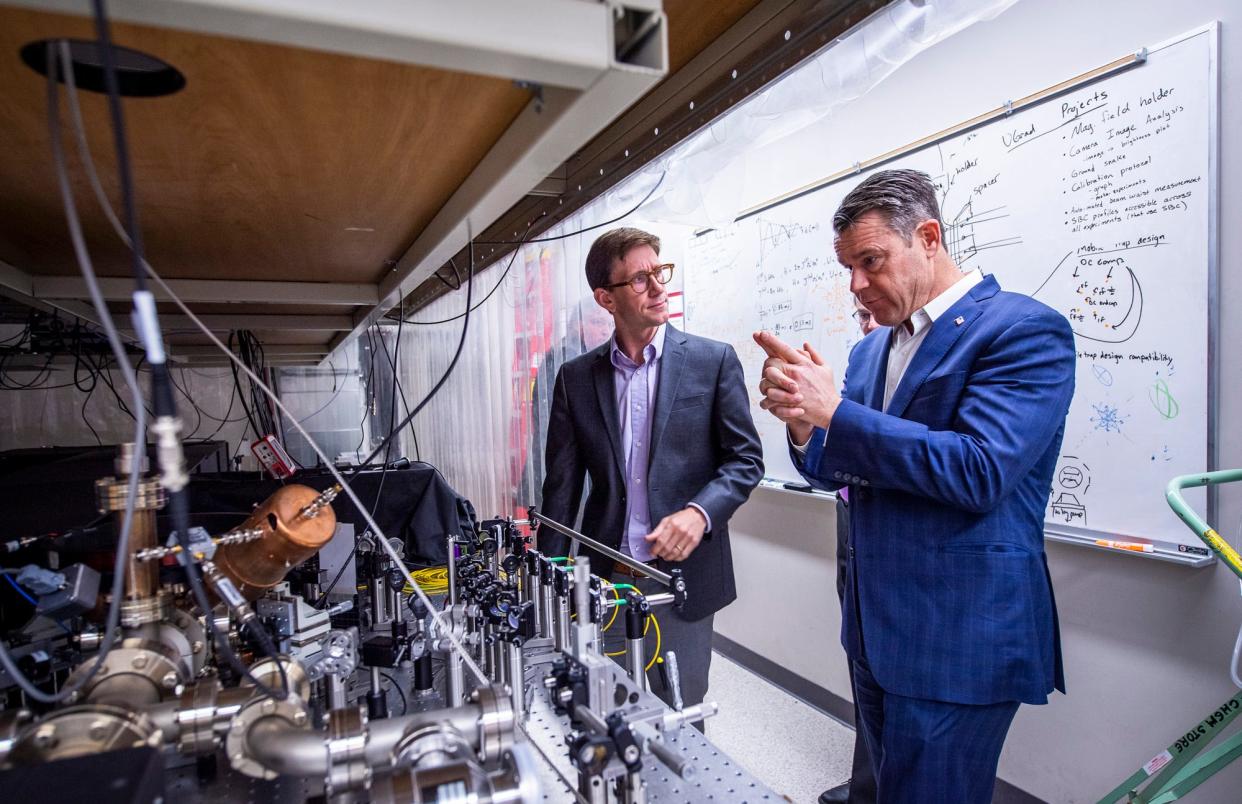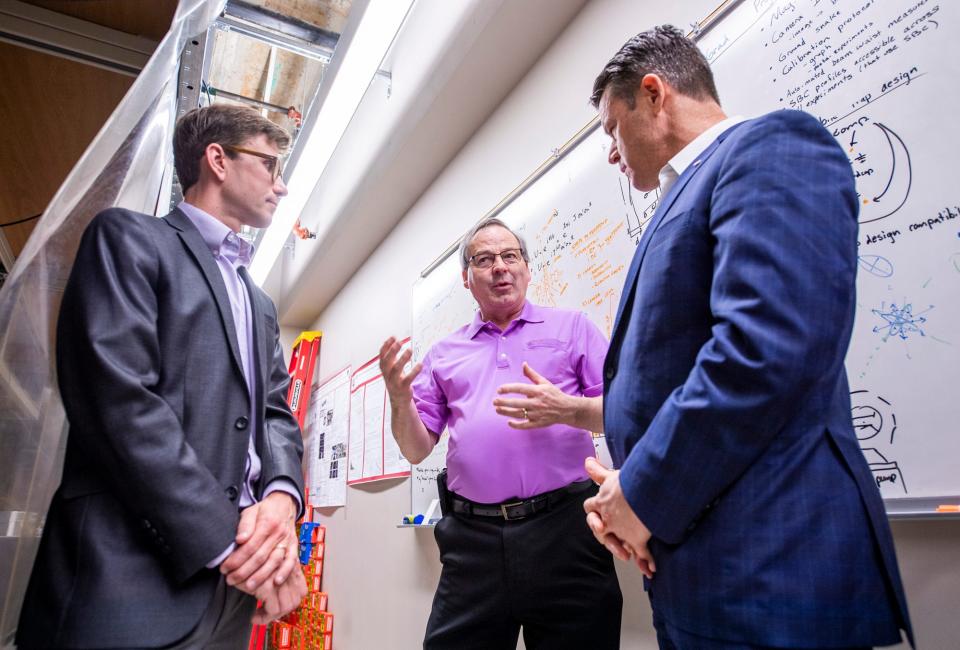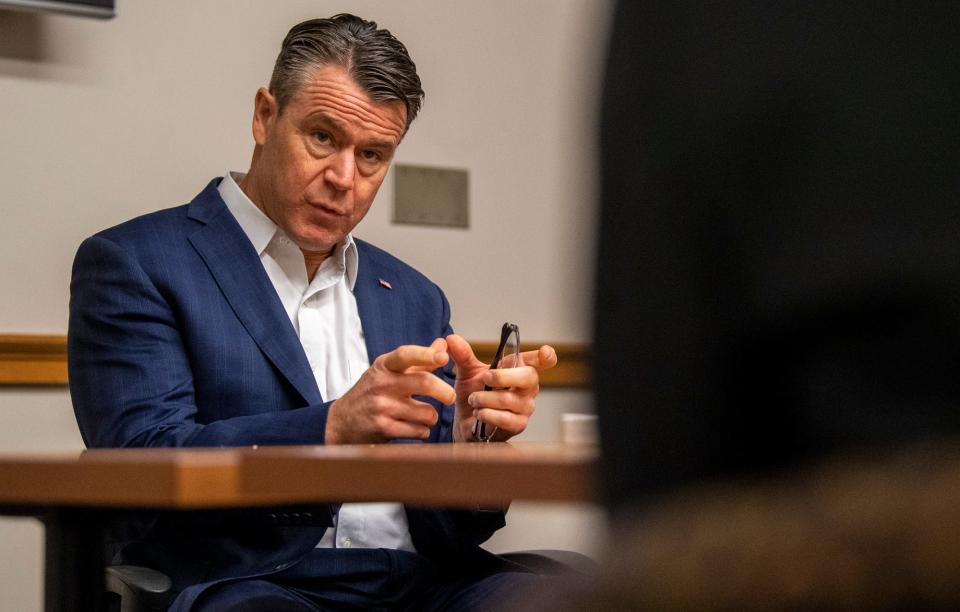Sen. Todd Young talks CHIPS Act, quantum computing at Indiana University

U.S. Sen. Todd Young toured a physics lab at Indiana University Monday and said a recently adopted $252 billion federal piece of legislation would support research into next-generation computing and create jobs in the “industries of the future.”
The legislation, called the CHIPS Act, provides incentives to produce semiconductors and for research and innovation in sciences including materials, biology and quantum information.
'Where do I begin?': US Sen. Todd Young rejects Trump for 2024 presidential bid
Young, R-Ind., worked to get the legislation passed in part to prevent ceding leading-edge technology to America’s political adversaries.
“It’s an investment in our national security,” Young said Monday in IU’s science building after he had toured the quantum simulation lab that is part of the Quantum Science and Engineering Center.
The senator said the U.S. military relies on highly specialized computer chips that control radar systems, advanced fighter jets and other weapons platforms, and about 90% of those chips are being produced in Taiwan. Young said he and other congressional leaders believe research and production for those chips must be brought back to the U.S. to eliminate the nation’s vulnerability to having its computer chip supply chain interrupted by a pandemic or geopolitical crises.
According to the Indianapolis Star, a sister paper of The Herald-Times, the CHIPS Act passed “(i)n large part due to Young's attempts to persuade his Republican colleagues to join him.” The bill passed the Senate with support from every Democrat and 17 Republicans. President Joe Biden signed it into law last summer.
Strategic plan: Indiana University plans to change the first-year experience. Here's what we know.
What does the IU lab do?

Scientists at the lab study quantum mechanics, or “the science that governs the behavior of the universe at the atomic (and smaller) length scales."
What is quantum computing?
“Quantum computers are computers that consist of quantum bits, or ‘qubits,’ that play a similar role to the bits in today's digital computers,” according to the U.S. Department of Energy. “The laws of quantum mechanics allow qubits to encode exponentially more information than bits. By manipulating information stored in these qubits, scientists can quickly produce high-quality solutions to difficult problems. This means quantum computing may revolutionize our ability to solve problems that are hard to address with even the largest supercomputers.”
Why is the CHIPS Act important to IU?
The legislation provides $200 billion for research. Young said he expects academic institutions and private industry in Indiana to get some of those funds.
Phil Richerme, associate professor of physics at IU, said the industry desperately needs personnel.
“We are already running out of people,” he said as he stood next to some high-tech equipment that was suspending particles in a near-vacuum-environment chamber.
Richerme said the nation doesn’t just need a thousand people with a doctorate in physics but also computer programmers and electrical and mechanical engineers in the private sector to take advantage of the research that's being done.
Federal help in town: FEMA opens Disaster Recovery Center in Stinesville to help storm, tornado victims
Too often, the U.S. educates and trains the best and the brightest, often from overseas, only to see many of them return to their homelands because they can get more research funding there.
David Baxter, professor of physics and chair of the physics department, said that while research dollars in the U.S. are available, they pale in comparison to what other nations are providing, which often prompts graduates to go elsewhere.
"We're having trouble competing," Baxter said.
Young acknowledged that’s a problem.
“We’re shooting ourselves in the foot, no question,” he said.
How could the CHIPS Act benefit Indiana?

Young said funding that will go to universities, such as IU, and to private companies, such as Samtec, will support research, which will draw private investment and create new businesses.
“Multiple companies are in conversations with the state of Indiana right now about also potentially locating their manufacturing operations here in the state,” Young said.
Boris Ladwig can be reached at bladwig@heraldt.com.
This article originally appeared on The Herald-Times: Sen. Todd Young visits Indiana University's quantum computing lab


